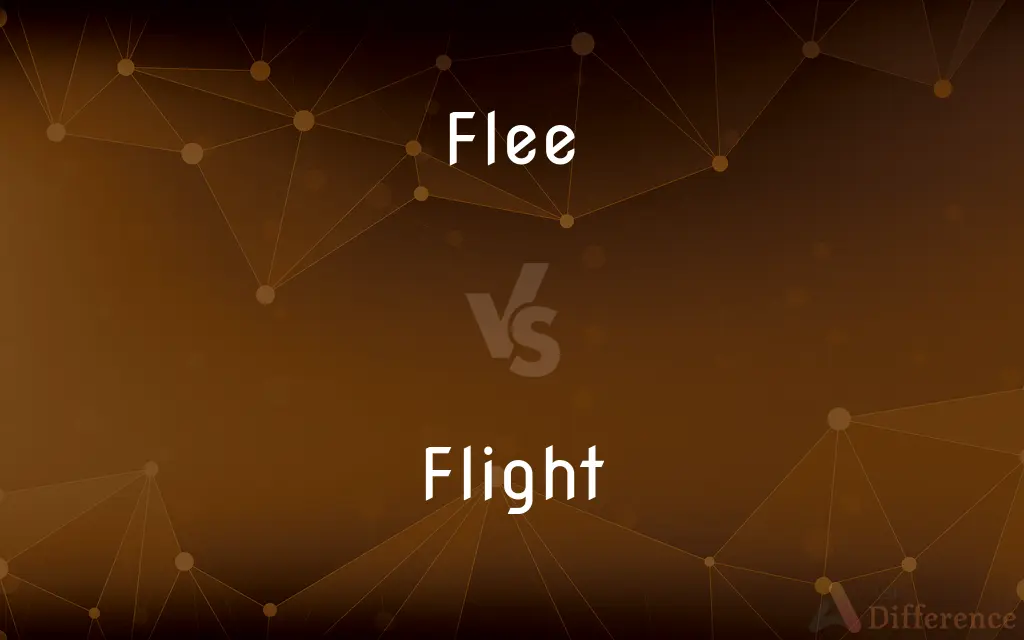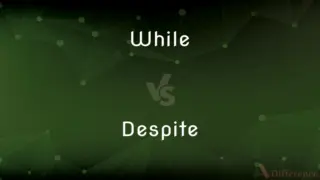Flee vs. Flight — What's the Difference?
By Tayyaba Rehman & Urooj Arif — Updated on April 8, 2024
Flee involves actively running away from danger, while flight can mean either the act of fleeing or the act of flying.

Difference Between Flee and Flight
Table of Contents
ADVERTISEMENT
Key Differences
Flee refers to the act of running away from a place or situation to escape danger or persecution. It implies a sense of urgency and immediate danger, focusing on the action of escaping. Whereas, flight can refer to the act of fleeing or escaping, but it also broadly encompasses the act of flying, whether by birds, aircraft, or other means. This duality gives "flight" a wider range of meanings compared to the singular focus of "flee."
While "flee" is used exclusively in contexts involving escape, often laden with fear or compulsion, flight is used in a broader sense that can include physical flight through the air. Flight, when used in the sense of escaping, can carry a less intense connotation than flee, which typically suggests a desperate or urgent escape from harm.
Flee is a verb that focuses on the action of escaping from a specific threat or danger. It is often used in situations where the escape is immediate and driven by fear or danger. On the other hand, flight, when used to mean escaping, can be used both as a noun and a verb, adding flexibility to its usage.
The urgency associated with "flee" often involves physical exertion and is commonly used in serious or perilous situations. In contrast, "flight" can denote a planned or strategic withdrawal from a situation, not necessarily under immediate threat, especially when used in a metaphorical sense.
Flee typically requires an object or situation to escape from, emphasizing a reaction to danger. Flight, in the context of escaping, may not always specify what is being fled from, offering a more general or abstract notion of escape or withdrawal.
ADVERTISEMENT
Comparison Chart
Part of Speech
Verb
Noun, Verb
Definition
To run away from danger or pursuit.
The act of flying or escaping.
Usage
Specifically for escaping danger.
Broad, can refer to escaping or flying.
Connotation
Urgency, fear, immediate danger.
Can be less urgent, includes physical flying.
Example
"The villagers fled the approaching wildfire."
"Birds take flight at the first sign of danger."
Compare with Definitions
Flee
To escape from a place or situation quickly due to danger.
The spies had to flee the country after their cover was blown.
Flight
The act of flying, typically through the air.
The flight of the eagle was majestic as it soared above the mountains.
Flee
To avoid a threatening or unwanted situation.
She decided to flee the meeting rather than face further humiliation.
Flight
A swift movement or passage.
Her flight from the room left everyone in shock.
Flee
To pass swiftly away; vanish.
As the years flee by, technology continues to advance rapidly.
Flight
The action of fleeing or escaping from something.
His flight from the authorities ended when he was caught in another state.
Flee
To take flight, escape hastily.
The family fled their home during the earthquake.
Flight
A series of steps or stairs between floors or levels.
He raced up the flight of stairs to catch the suspect.
Flee
To run away from someone or something.
The thief fled the scene when he heard the police sirens.
Flight
A journey made by an aircraft, from takeoff to landing.
Their flight to New York was delayed due to bad weather.
Flee
To run away, as from trouble or danger
Fled from the house into the night.
Flight
Flight or flying is the process by which an object moves through a space without contacting any planetary surface, either within an atmosphere (i.e. air flight or aviation) or through the vacuum of outer space (i.e.
Flee
To pass swiftly away; vanish
"of time fleeing beneath him" (William Faulkner).
Flight
The motion of an object in or through a medium, especially through the earth's atmosphere or through space.
Flee
To run away from
Flee the scene of an accident.
Flight
An instance of such motion.
Flee
(intransitive) To run away; to escape.
The prisoner tried to flee, but was caught by the guards.
Flight
The distance covered in such motion
The long flight from Seattle to Little Rock.
Flee
(transitive) To escape from.
Many people fled the country as war loomed.
Thousands of people moved northward trying to flee the drought.
Flight
The act or process of flying through the air by means of wings.
Flee
(intransitive) To disappear quickly; to vanish.
Ethereal products flee once freely exposed to air.
Flight
The ability to fly
Flight is characteristic of nearly all birds.
Flee
To run away, as from danger or evil; to avoid in an alarmed or cowardly manner; to hasten off; - usually with from. This is sometimes omitted, making the verb transitive.
[He] cowardly fled, not having struck one stroke.
Flee fornication.
So fled his enemies my warlike father.
Flight
A swift passage or movement
Barely noticed the flight of time.
Flee
Run away quickly;
He threw down his gun and fled
Flight
A scheduled airline run or trip into space
The 7:00 flight to New York.
The next flight of the space shuttle.
Flight
A group, especially of birds or aircraft, flying together.
Flight
A number of aircraft in the US Air Force forming a subdivision of a squadron.
Flight
A round of competition, as in a sports tournament.
Flight
An exuberant or transcendent effort or display
A flight of the imagination.
Flights of oratory.
Flight
A series of stairs rising from one landing to another.
Flight
A curved plate or flange that winds in a spiral around the center shaft of an auger, designed to transport loose material upward or backward along the shaft as the auger rotates. Also called flighting.
Flight
A set of small samples, as of different kinds of wine or beer, that are served at the same time for comparative tasting.
Flight
The act or an instance of running away; an escape.
Flight
To migrate or fly in flocks.
Flight
The act of flying.
Most birds are capable of flight.
Flight
An instance of flying.
The migrating birds' flight took them to Africa.
Flight
(collective) A collective term for doves or swallows.
A flight of swallows
Flight
A trip made by an aircraft, particularly one between two cities or countries, which is often planned or reserved in advance.
The flight to Paris leaves at 7 o'clock tonight.
Where is the departure gate for flight 747? / Go straight down and to the right.
Flight
A series of stairs between landings.
Flight
A group of canal locks with a short distance between them
Flight
A floor which is reached by stairs or escalators.
How many flights is it up?
Flight
The feathers on an arrow or dart used to help it follow an even path.
Flight
A paper airplane. en
Flight
(cricket) The movement of a spinning ball through the air - concerns its speed, trajectory and drift.
Flight
The ballistic trajectory of an arrow or other projectile.
Flight
An aerodynamic surface designed to guide such a projectile's trajectory.
Flight
An air force unit.
Flight
Several sample glasses of a specific wine varietal or other beverage. The pours are smaller than a full glass and the flight will generally include three to five different samples.
Flight
(engineering) The shaped material forming the thread of a screw.
Flight
An episode of imaginative thinking or dreaming.
A flight of fancy; a flight of the imagination
Flight
The act of fleeing.
Take flight
The flight of a refugee
Flight
(obsolete) Fast, swift, fleet.
Flight
To throw the ball in such a way that it has more airtime and more spin than usual.
Flight
To throw or kick something so as to send it flying with more loft or airtime than usual.
Flight
The act of flying; a passing through the air by the help of wings; volitation; mode or style of flying.
Like the night owl's lazy flight.
Flight
The act of fleeing; the act of running away, to escape danger or expected evil; hasty departure.
Pray ye that your flight be not in the winter.
Fain by flight to save themselves.
Flight
Lofty elevation and excursion; a mounting; a soaring; as, a flight of imagination, ambition, folly.
Could he have kept his spirit to that flight,He had been happy.
His highest flights were indeed far below those of Taylor.
Flight
A number of beings or things passing through the air together; especially, a flock of birds flying in company; the birds that fly or migrate together; the birds produced in one season; as, a flight of arrows.
Swift flights of angels ministrant.
Like a flight of fowlScattered winds and tempestuous gusts.
Flight
A series of steps or stairs from one landing to another.
Flight
A kind of arrow for the longbow; also, the sport of shooting with it. See Shaft.
Challenged Cupid at the flight.
Not a flight drawn homeE'er made that haste that they have.
Flight
The husk or glume of oats.
Flight
A trip made by or in a flying vehicle, as an airplane, spacecraft, or aeronautical balloon.
Flight
A scheduled flight{8} on a commercial airline; as, the next flight leaves at 8 o'clock.
Flight
A formation of aircraft in flight
Flight
An instance of traveling by air;
Flying was still an exciting adventure for him
Flight
A stairway (set of steps) between one floor or landing and the next
Flight
The act of escaping physically;
He made his escape from the mental hospital
The canary escaped from its cage
His flight was an indication of his guilt
Flight
An air force unit smaller than a squadron
Flight
Passing above and beyond ordinary bounds;
A flight of fancy
Flights of rhetoric
Flights of imagination
Flight
The path followed by an object moving through space
Flight
A flock of flying birds
Flight
A scheduled trip by plane between designated airports;
I took the noon flight to Chicago
Flight
Shoot a bird in flight
Flight
Fly in a flock;
Flighting wild geese
Flight
Decorate with feathers;
Fledge an arrow
Common Curiosities
What does it mean to flee?
To flee means to run away from a place or situation to escape danger.
Is fleeing always due to fear?
Typically, yes. Fleeing is usually a response to fear or danger.
Is "flee" always used in urgent contexts?
Yes, "flee" implies an urgent escape from immediate danger.
Can "flight" be used metaphorically?
Yes, "flight" can be used metaphorically to describe a quick or strategic withdrawal from a situation.
Does "flight" always involve physical movement?
Primarily, yes, though it can be used metaphorically to describe non-physical escapes or movements.
How does the usage of "flee" differ from "flight"?
"Flee" is used specifically to describe escaping danger, while "flight" has broader uses, including flying and escaping.
Can "flight" refer to escaping danger?
Yes, "flight" can refer to escaping danger as well as the act of flying.
What are examples of situations where one might flee?
Examples include fleeing from natural disasters, threats, or persecution.
How does "flight" relate to birds?
"Flight" describes the action of birds flying.
Is "flight" commonly used in aviation?
Yes, in aviation, "flight" refers to the journey of an aircraft from takeoff to landing.
Can "flight" refer to a sequence of stairs?
Yes, "flight" can also refer to a series of steps or stairs between floors or levels.
What does "take flight" mean?
It can mean to begin flying or to start fleeing.
Can animals exhibit flight behavior?
Yes, animals can exhibit flight behavior as a response to threats.
How does the connotation of "flee" differ from "flight"?
"Flee" connotes a more urgent, fear-driven escape, while "flight" can be less intense and includes the concept of flying.
Can "flee" be used in a non-physical sense?
It's primarily used for physical escape, but metaphorically, it can describe avoiding situations.
Share Your Discovery

Previous Comparison
Lecturer vs. Reader
Next Comparison
While vs. DespiteAuthor Spotlight
Written by
Tayyaba RehmanTayyaba Rehman is a distinguished writer, currently serving as a primary contributor to askdifference.com. As a researcher in semantics and etymology, Tayyaba's passion for the complexity of languages and their distinctions has found a perfect home on the platform. Tayyaba delves into the intricacies of language, distinguishing between commonly confused words and phrases, thereby providing clarity for readers worldwide.
Co-written by
Urooj ArifUrooj is a skilled content writer at Ask Difference, known for her exceptional ability to simplify complex topics into engaging and informative content. With a passion for research and a flair for clear, concise writing, she consistently delivers articles that resonate with our diverse audience.














































